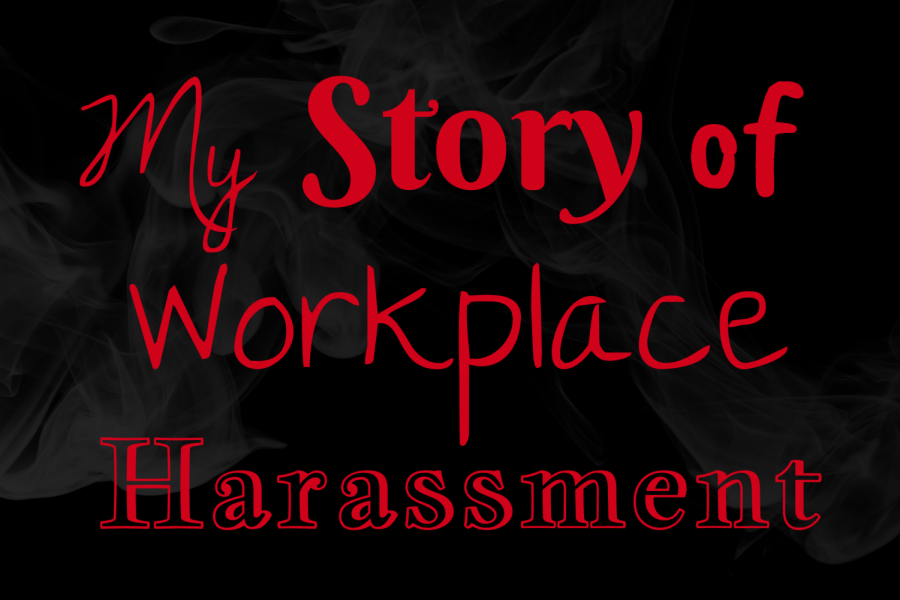My story of workplace harassment
April 9, 2020
The names used in this article have been changed to maintain privacy.
Feeling uncomfortable around coworkers, receiving invitations to bars and clubs and having superiors constantly offering alcohol and marijuana aren’t things any teenager should have to deal with, especially in the workplace. But starting at the beginning of last summer, it was something I dealt with for almost a year.
Sexual harassment in the workplace is far from uncommon. According to NPR, almost 40% of women have experienced sexual harassment at work.
A workplace should have open communication, a professional atmosphere and most importantly, be safe. I never felt any of these at my former job. Most of the people whom I worked with were over 20 years old. A rising high-school senior, I was the youngest employee for most of the summer. All of my colleagues knew this.
On my first day on the job, I received a strange comment from a 23-year-old coworker. “Hi, my name’s Dylan, but people call me ‘Big D.’” I had never spoken to him before. I didn’t know how to respond — so I awkwardly laughed and walked away. I probably shouldn’t have brushed it off, but because it was my first day of my first job ever, I said nothing.
Afterward, I asked a friend at work what Dylan’s deal was, and she said, “He just does that,” she told me. “He even hit on my sister last year when she was 15.” This completely shocked me. I wanted to do something, but I figured, I was only 17 — what could I do? I just put my head down and tried to avoid him as much as possible.
As the weeks progressed, he started coming up to me while I was setting up for work. He asked me what kinds of drinks I liked and if I ever wanted to get a drink at a bar with him. Even after I reminded him that I was 17 and still in high school, he said, “It’s fine, I know people who could get you in.”
His approaches were happening more often even though I declined his offers. I felt I had to finally just say something, so I turned to one of my three bosses — the one I was closest to — Karen.
“Oh, it’s just Dylan,” she explained. “He’s always like that. He’s a good guy, he just doesn’t know how to act in front of women.”
Her response appalled me. Out of everything I witnessed, the fact that a 22-year-old woman condoned Dylan’s behavior is what still surprises me the most.
I decided to ask other coworkers about Dylan, and they offered the exact same excuses. I felt powerless; Dylan would keep approaching me and hovering for as long as he wanted, regardless of how it affected me.
Throughout the summer, other coworkers told me my tennis skirt was too short, that I looked “too cute to work,” or that “I was showing more skin today” when my shoulders were showing through a tank top. One day, it was my legs that were “so thin.” The coworkers who made these comments were all in their early twenties, and the age difference made me extremely uncomfortable, but no amount of reporting had helped before. I was too scared to tell them to stop, too deflated to bother.
After the summer, I weighed my options and decided to keep working there. I loved my job — just not my coworkers. I was on a regular schedule that fit with my academic life, and the people I had to work closely with were generally nice. I thought it would be okay.
But one of my other three bosses, 24-year-old Brad, started acting bolder towards me as time passed. One night when I was leaving work late and couldn’t walk home, Brad offered me a ride. I had never had any bad interactions with him at that point, so I gratefully agreed. As we were driving to my house, he offered me his Juul — which I refused. As he parked in my driveway, he told me that my house was big, I should host a party and invite him. I was more than a little weirded out — it suddenly felt like Brad had started down Dylan’s same path.
As the year progressed, his actions got weirder. He once sent me a “you up?” text at 1 a.m.. Whenever I ran into him at work, he wanted to know about my plans for each weekend. He asked me if I would volunteer, unpaid, for a company work event. As “compensation,” he offered to take me out to lunch and give me some free marijuana. I declined, but part of me worried that I shouldn’t. This was my boss: my job was in his hands.
I was sick of all of it, all of the comments, questions and pressure, all of the offers to get intoxicated to the point where I’m out of control, all of the things said out loud about my body. I had to tell someone who would actually listen.
The next week, I broke down to a school counselor and told her everything that had happened. She didn’t force me to do anything; she just let me cry and supported me. She told me it wasn’t my fault, because it wasn’t.
My counselor told me that when a student is harassed in the workplace, the student doesn’t have to report specific people if he or she doesn’t want to. If the student does tell the counselors specific names, however, the counselor has to call the U.S. Equal Employment Opportunity Commission and report each harasser. Talking to a counselor is confidential, and counselors cannot force victims to provide any information that they’re uncomfortable sharing.
My counselor did ask me to call a parent about the sexual harassment, so I called my dad, just to make him aware of the situation. She also asked me if I felt comfortable quitting since it was an unsafe work environment. Slowly, I started to see that the benefits of my job no longer outweighed the downsides. She didn’t force me to quit, but I eventually did. I was tired of having my concerns so completely ignored.
Work is a necessity; no one should feel uncomfortable or unsafe at work, and my experience just should not be the norm. Unfortunately, right now, it is.
I don’t regret taking the job or keeping at it; some of my coworkers were wonderful people, and I made some of the closest friends I’ll ever have. I loved the actual work aspects of what I did, but I also felt unsafe there. Few colleagues I talked to seemed to care about the sexual harassment I had begun to experience. Those dismissals, as common as harassment itself, need to change, too.







